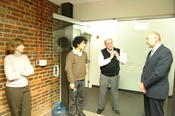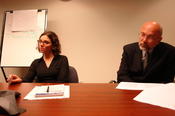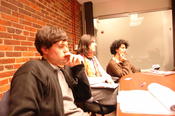Sojourners
Soujourners Magazine ist eine monatlich erscheinende Zeitschrift der christlichen Organisation Sojourners/Call to Renewal und wird seit 1971 veröffentlicht. Hauptthemen der Publikation sind Christliches Leben, Soziale Probleme, Kirche und Welt sowie Christentum und Politik.
Interview mit Christa Mazzone
(vorbereitet von Cameron Abadi)
Is it difficult to encourage diversity while you’re still advocating a particular progressive brand of Christianity yourselves? Is there tension between those two goals – between being a progressive religious organization and a pluralistic advocacy group?
CM: I’ll use Call to Renewal, which is a partner organization of Sojourners, as an example to answer your question. We focus only on domestic poverty, and in doing so we’ve really been able to bring together a broader array of Christians. But even still we’ve had tension between keeping this broad table and taking prophetic stances. For example, one contentious issue would be tax cuts. Not every single person on our board would think that tax cuts for the wealthy are unbiblical. Some might have a more conservative social welfare approach, where they think that tax cuts for the wealthy would trickle down to the poor. Whereas many of our partners feel that we should be very prophetic and speak out against tax cuts that benefit the richest country at the same time that we have the deficit and the war and poverty. So that’s an example of a real tension that we’re constantly wrestling with: well, should we be prophetic about this, or is this an issue that we kind of have to step aside and let others kind of address because we want to keep our coalition.
So you do work together with religious right organizations?
CM: We don’t have the religious right as our target audience. But we want to keep an open invitation to them, to work with them. Again, that’s another area where there’s a new tension. We want to hold our brothers and sisters accountable who are claiming to represent the Christian faith, but are often doing it in a kind of very divisive, hurtful manner but at the same time we don’t want to sort of call them out in a way that’s either: a) self-righteous; or b) disallows us from engaging in partnership with them.
Are you ever concerned that with increased dialogue, that maybe people on the right will actually dominate the conversation because they’re not necessarily interested in dialogue?
CM: I think the easy answer is “No”. I think we’re not afraid to help give them air-time, by engaging in dialogue with them, because when there is real conversation, it’s clear to that ours is an approach that’s more thoughtful and more spiritually grounded than they realized. I’m not saying we’re perfect and that we know exactly how to interpret the Bible or that we have all the answers, but I think that, especially more than people realize, that ours is an approach that’s spiritually grounded and that it’s more, perhaps, broad and inviting. I think the religious right approach is very narrow and very focused on just a few issues and not the broader array of social issues and political issues that our faith calls us to take care about.
It seems though that the right has really done a really good job of organizing itself in the last thirty years or so. What were progressive Christians doing during that period of time?
CM: I think the conservative had a real sort of bottom-up approach, I think they also had a real partnership with the Republican Party. I think that political conservatives joined forces with social conservatives, so somehow or another I think there was a real intentional partnership between people who were political conservatives and fiscal conservatives and people who were social conservatives, and they realized, hey if we work together we’ll be stronger. I think that one thing that progressives need and that that has been lacking is a real solid vision. If you look at the civil rights movement, for example, the progressive faith community was a real leader in that movement and it was the black churches who made up the backbone of the civil rights movement and there was a real vision of what they were working for. I think many of the Democratic folks have forgotten the role that faith has played in social movements like this.
What’s your take on President Bush’s faith-based initiatives?
CM: We realized soon after President Bush was elected that he would not put his money where his mouth is in terms of actually having a consistent concern for those who are living in poverty. So a little bit of money was given to faith-based organizations dealing with poverty, but when it came to all other policies having to do with poverty -- like our federal budget, like a war that’s going to hit the poor in our country the hardest, etc -- time and again, he wasn’t a very compassionate conservative.
Do you think that progressive evangelism is turning the tide against fundamentalism?
CM: Yes, definitely. More and more young people from evangelical colleges are no longer seeing their faith as personal only, they are no longer only concerned with only two or three issues that their parents or church told them to be concerned with, but are really starting to measure engagement in public life considering an array of social issues. And I think that we are getting more organized. I think that there really is a new energy.
Do you think the Bible advocates progressive politics?
CM: I don’t think that an objective person could look at it and say the Bible lends itself to a progressive platform. I think that’s maybe a little bit too simplistic. I think it’s a mysterious document that requires a lot of thought and a lot of dialogue. But, yes, I think that overall, the Bible advocates for the dignity of all people and justice and fairness and a whole lot of compassion and I think that really does lend itself to policies that are less conservative in their approaches, and perhaps…
Do you think it’s ever difficult for people who are not Christian in America to feel included in this public discussions that are based on Christian values?
CM: I think personally that Jim Wallis does a good job when he’s talking on radio shows and in public forums about making it clear that we don’t think that religion has a monopoly on morality. And that we want to invite all folks who care about peace and justice into the fold. But it’s hard, you have to be sensitive. There are good models for that. Martin Luther King Jr. who was a Christian, and he spoke very strongly from his Christian perspective, but there were Jews and agnostics and atheists who were very much part of that movement and were inspired by his work. So, yes, it’s hard, but I think we should be sensitive to that. And for the most part folks appreciate our approach.
Do you think a concern with the afterlife, like in the Left Behind series of books, leads to conservative politics?
CM: I don’t think that it’s like we ignore the idea of judgment or we ignore an afterlife. I think quite to the contrary, most of us take Matthew 25 seriously when he says that you’ll join me in Heaven if you’ve clothed the needy, fed the hungry. And yes, I think you’re right, and there are two different approaches. One is concerned with afterlife and judgment and one believes that Christ will come again and that’s a time period to look forward to, but we’re called to make our life count here and make life better for those for whom it’s not so great right now.
Bilder des Interviews
(Die Bildergalerie startet mit der Auswahl eines Bildes. Über die in den Bildflächen integrierten Pfeilsymbole kann vor und zurück navigiert werden; das Kreuzsymbol im Textfeld beendet die Bildergalerie.)






